Whether it’s a new school or new job, there’s often some sort of “try out” to see if you cut the mustard. In this week’s episode, both of our storytellers share stories about their own inductions.
Part 1: When Colleen McDermott signs up to be a forestry conservationist for the summer, they soon notice that none of their colleagues look like them.
Colleen McDermott, originally from Philadelphia, is a current undergraduate at Washington University in St. Louis. Studying environmental analysis and writing, Colleen loves both conservation and communications. In their spare time, they enjoy hiking, reading, and playing whatever percussion instrument is nearby.
Part 2: On Pete McCorvey’s first deployment in the United States Navy, he is dreading the part of training where he gets pepper sprayed.
A native of Moss Point, MS, Pete McCorvey has travel around the world as both a comedian and as a U.S. Navy Sailor. He has met many people and experience many things that has shaped and challenged his outlook on the world we live in. In his spare time, Pete enjoys reading, writing, podcasting and discovering new and historical locales in his immediate area.
Episode Transcript
Part 1
I know I'm not the only one who made an impulsive decision in the year 2020. COVID and quarantine had everyone going stir crazy, right? For most people, though, that meant they were cutting their own bangs, baking 10 pounds of banana bread all at once. I decided to become a lumberjack.
I was 18 years old in my first semester of college and, at that point, these supposed best four years of my life were not off to a pleasant start. Almost all of my classes were on Zoom. I was lonely and, most of all, I was sick of my dorm room. Sick of sitting in there, staring at the same four off‑white walls.
So I dreamed of the outdoors. In my head, I was somewhere in the forest and mountains, on an adventure somewhere. By the time February rolled around, I'd been hired by Philmont Scout Ranch to spend three months working as a forestry conservationist.
If you don't know, Philmont is basically like a Boy Scout pilgrimage site. Every summer, thousands of scouts and their adult supervisors will travel to Northern New Mexico for these hiking expeditions across the backcountry. One day of that track has to include a three‑hour conservation project, which is what I would be overseeing.
The position description made it out to be hard work. This was 10‑hour work days for 10 days at a time with only three days off but I was stoked anyway. The position description also said stuff like, “This is serious wildfire prevention business and you will be required to operate a chainsaw.”
I was like, “Okay. Yeah. Sign me up.” I’ve never touched a chainsaw in my life.
When people ask me why I was pursuing forestry that summer, my response was, “Well, I like forests. “ I was so far out of my element yet so excited by the prospect of this adventure to even care.
So I started exercising more. I broke in my new steel toe, full grain leather work boots. I thought I had everything under control.
Then summer arrived and I arrived at Philmont. And my reality slapped me in the face that day. Suddenly, everything was real. My dad had flown across the country with me to drop me off and I was so nervous that morning I wouldn't even speak to him. I hardly even said goodbye.
Colleen McDermott shares their story at Public Media Commons in St. Louis, MO in February 2023. Photo by Joe Martinez.
I walked around those beige buildings and tents that made a base camp, collected my uniform and name tag with trembling hands. And, along with this realization that I was way in over my head, I realized something else with every new person I met. Nobody looked like me.
I am asexual and genderqueer, assigned female at birth. At the time, I very much presented as a woman with long, curly red hair I tied back with ribbons and bows. Up until this point, I really hadn't given any thought as to the role my identity you could play in this new job. However, I quickly realized the kinds of people who know what words like ‘asexual’ and ‘genderqueer’ mean and the kinds of people who operate chainsaws on a daily basis generally don't intersect. Like in this Venn diagram, the circles are not even touching.
My fellow conservationists, they could pass as real lumberjacks. I'm talking Paul Bunyan, brawny paper towel guy, beard‑and‑flannel style loggers, like they looked the part. And watching them interact with each other that first day, I found myself looking in at this tough guy, CIS heteronormative culture that just felt complete and totally alien to me. For the first time, I found myself asking this question that I definitely should have asked back in February. Can I even lift a chainsaw? Like how heavy are these things? Can I hold it for an extended period of time? I get my answer quickly enough. Not easily.
The job started out with training in base camp and our first task was supposed to be simple. Just turn on your chainsaw and cut a log in half. If I haven't felt like an outsider before, I certainly felt like one when I couldn't even pull the cord hard enough to start the saw. Everyone else is standing there holding their revving saws and they're going, “Yank it harder. Yank it harder.”
Days later, we would realize I had been given a broken chainsaw. The Hulk could have pulled that cord and it wouldn't have started. But that's a problem for another time. Right now, I'm being judged by God's gifts to masculinity.
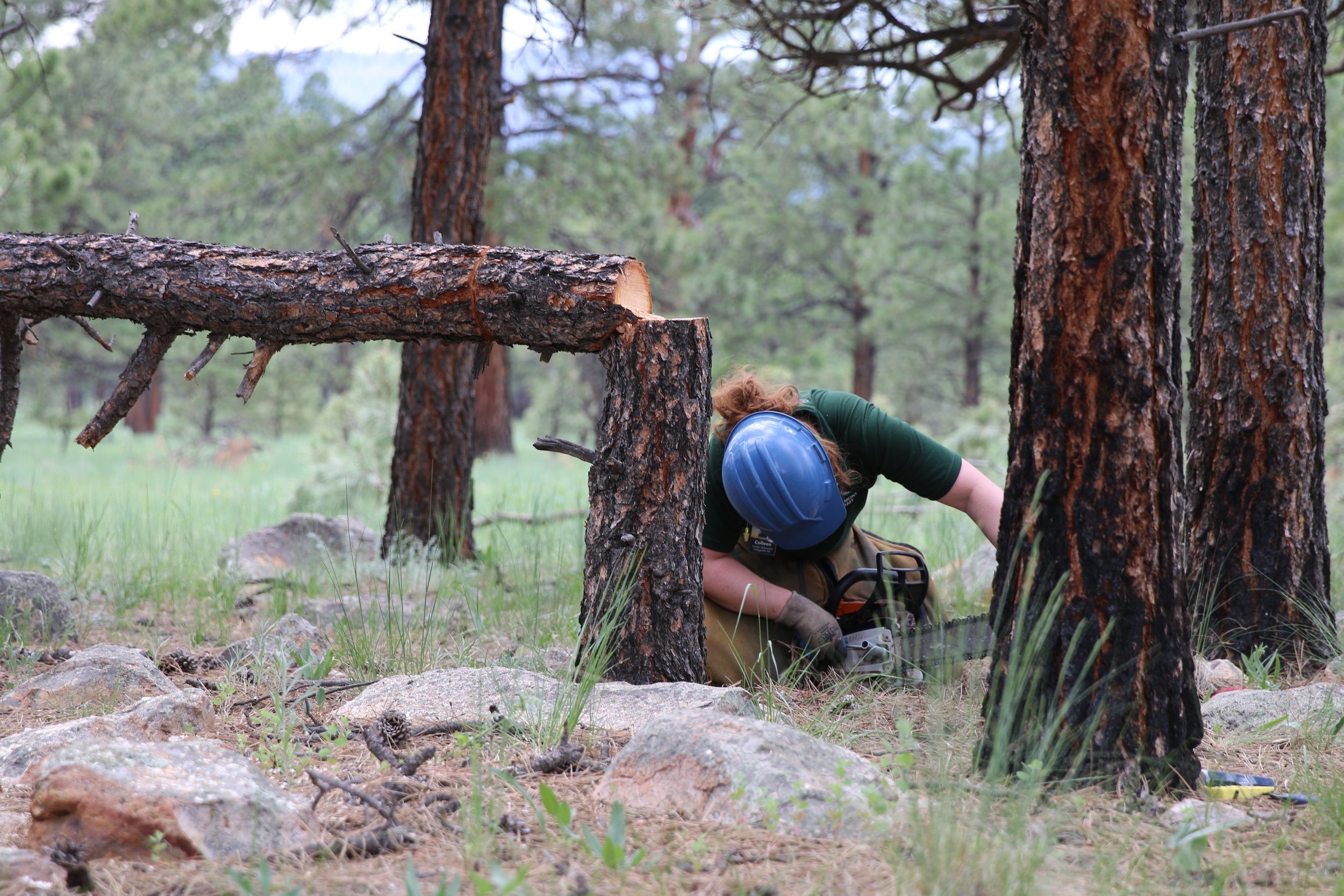
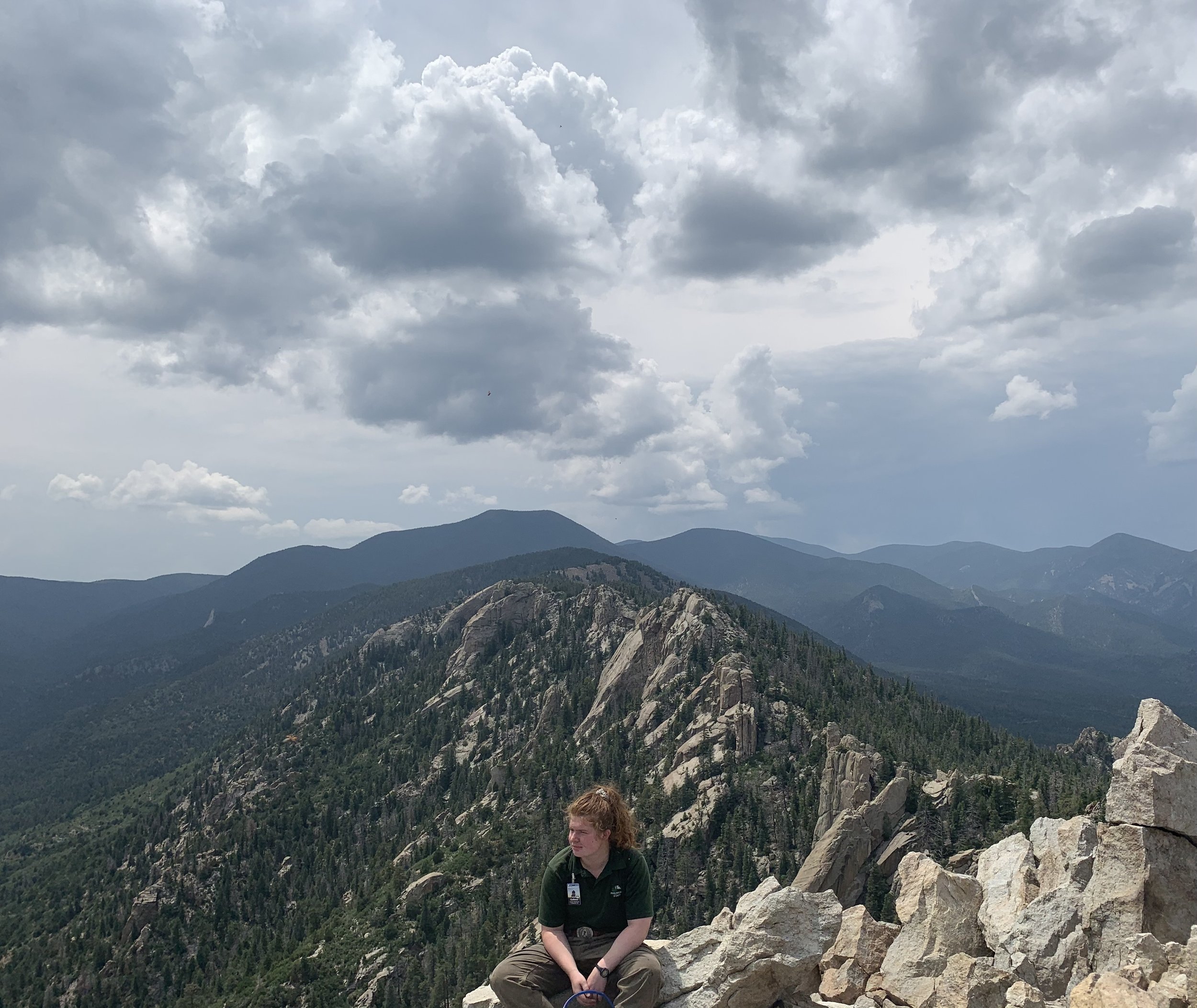
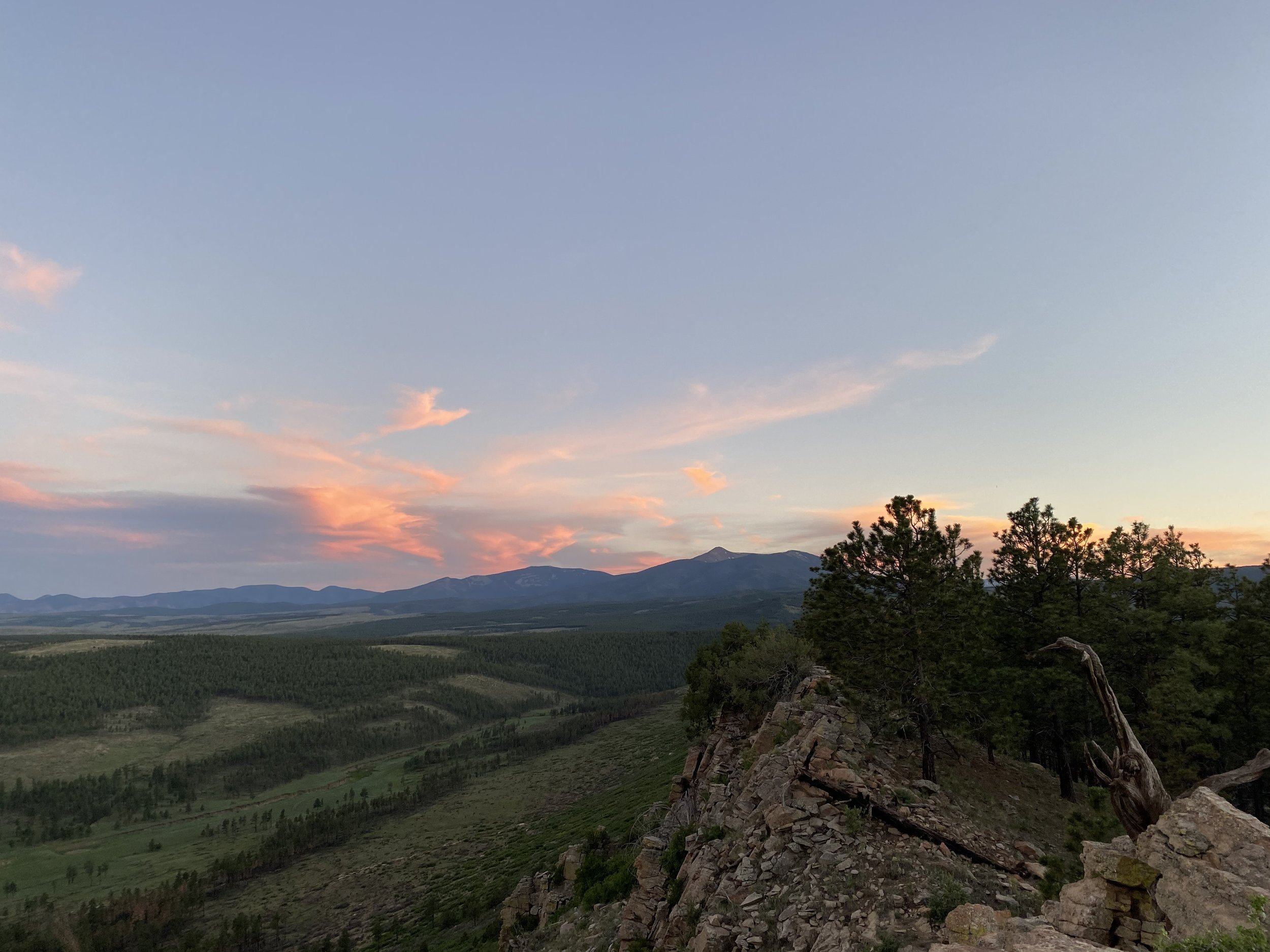
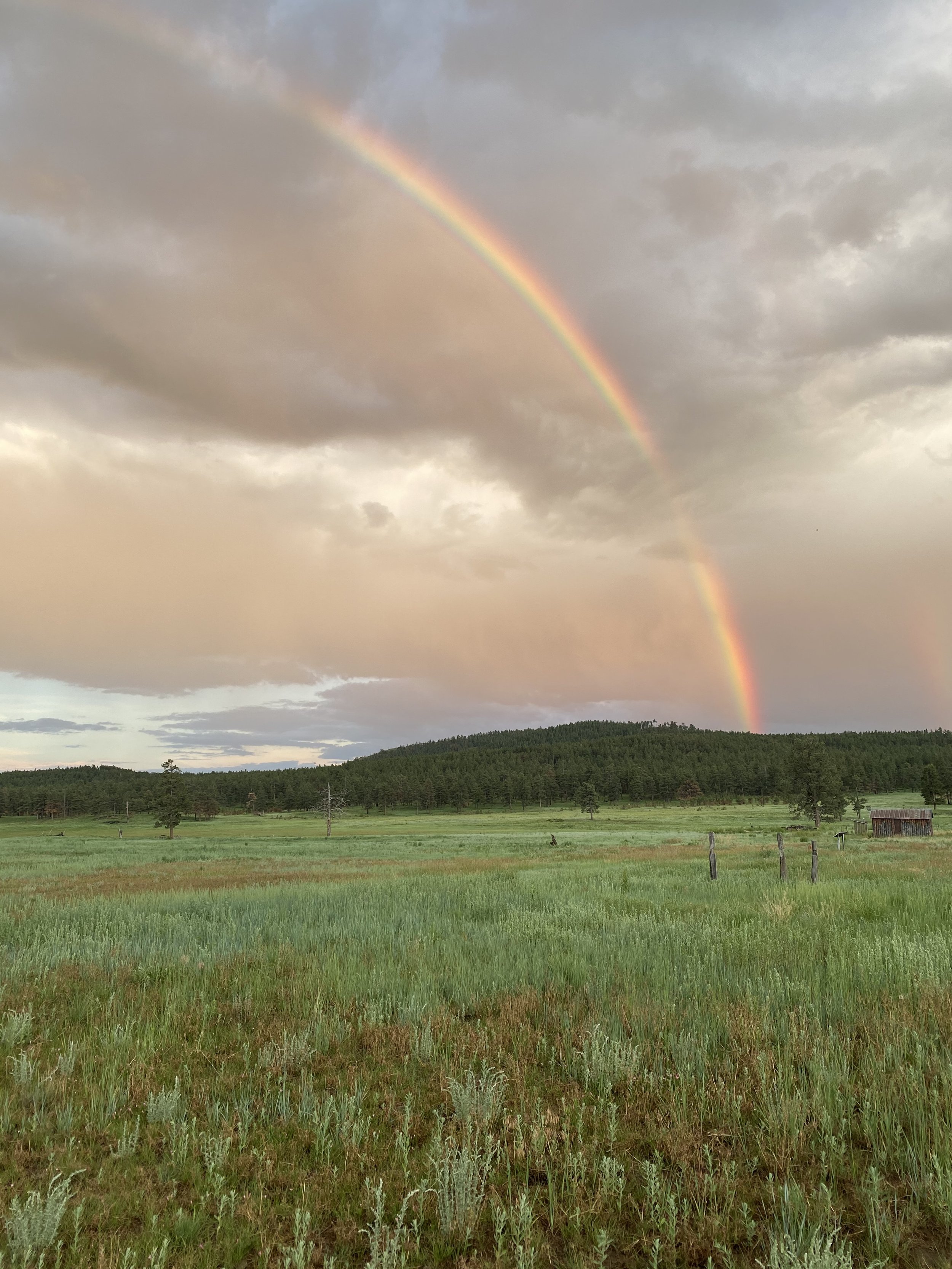
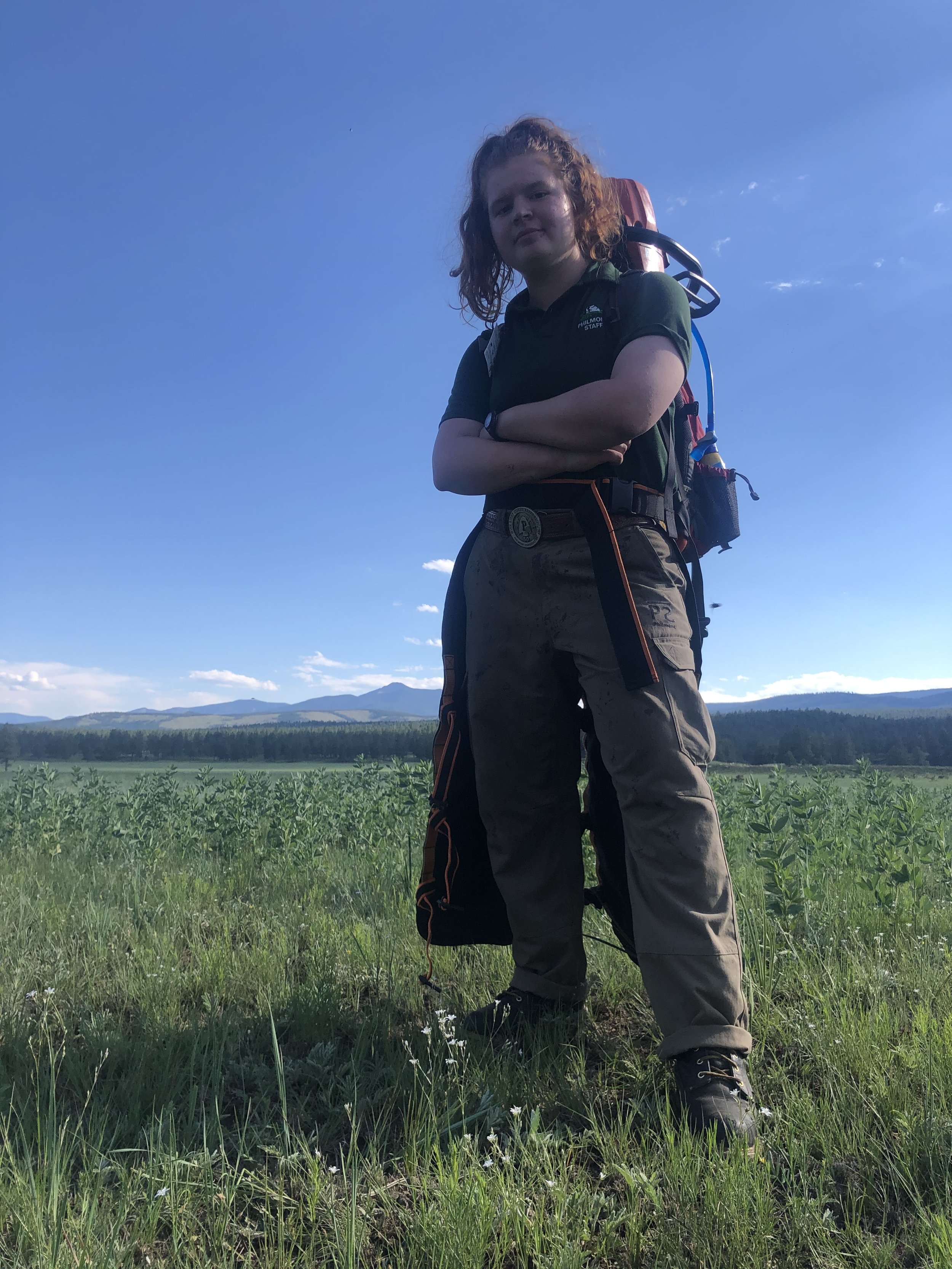
My muscles feel like jelly from pulling this cord for 15 minutes straight. And even when one of them handed me their saw to practice cutting this log with, my arms are straining under the weight.
So this training situation is not going fantastic. Fortunately, things went a little better for a while there. We learned wilderness first aid, how to operate a radio. We took a day hike into the backcountry where a New Mexico State Forester led us around, showed us how to identify all the different native trees: white fir and Engelmann spruce, Rocky Mountain juniper, ponderosa pine.
But before long, it was time for all cons, a seven‑day trek into the backcountry where the real training happened. So the whole conservation department, about 120 of us packed these massive backpacks full of gear and headed deep into the mountains. There we learned how to fell trees.
A big part of wildfire prevention is fuel thinning. This idea that if we're able to manually remove excess brush from the forest, then the next fire that goes through will have less kindling to work with. It won't be as severe.
Now, in the family tree of STEM, environmental science has always sort of felt to me like the weird, dirty cousin, but it's a science all the same. And learning these theoretical principles that underly the field of fire ecology, I felt for a moment like I was stepping back into my comfort zone. This was logical. Something that made sense. Even the act of felling a tree had this formulaic five‑step process I memorized with ease.
The thing is, as much as scientists may think we have a plan mapped out, there are always going to be variables we fail to account for. For me, it was my identity.
My first attempt at felling a tree went okay. It wasn't great but I showed promise. My second attempt was basically a sawyer’s worst nightmare. And as many times that I've told this story, I'll never be able to do the moment justice.
I remember we had picked out this tree. I went over the five‑step felling plan with my saw instructor. Their smile told me I had nailed it. And, as they stepped away from the tree, I stepped toward it, saw on hand. I began making all the necessary cuts. My earplugs were in. The chainsaw was roaring. I was in the zone.
And then above all that noise, I heard a scream, this high‑pitched terrified scream. My instincts took over. I just yanked the saw free from the bark and I took a single step to the right. And in doing so, I saved my life. Wind basically blew my hair back as this massive pine landed right where I had been standing, 180 degrees opposite the direction it was supposed to go. I remember just staying there frozen in shock for a few moments.
Colleen McDermott shares their story at Public Media Commons in St. Louis, MO in February 2023. Photo by Joe Martinez.
My saw instructor tried consoling me. They told me it wasn't my fault. It was this freak accident that they’d never before seen a tree just careen backwards like that even when all of my cuts and calculations were correct. But I was hardly listening. I could feel all the other conservationists’ eyes on me. And as much as I loved and understood the science of forestry, at the end of the day, I was a tiny, queer 18‑year‑old female and I thought, “I don't belong here. This job wasn't made for people like me.” With that, I promptly burst into tears.
My saw instructor was very nice. They led me to this secluded rock in the woods, told me to just take all the time I needed to console myself. For a while, as I sat there, I honest to God tried coming up with a lie I could use to get me sent home. Like I was at my limit. I was done.
But then I thought about my freshman year and the loneliness of my dorm room. I thought of all I had done in one short week, stuff I could have never imagined beforehand. I thought. I looked around me. I saw the forest in the mountains. I smelled pine and sawdust in the air. And I realized what an incredible place it was I was in. From an aesthetic perspective, sure, but from an ecological perspective as well.
During that day hike we had taken with the New Mexico State Forester learning the different native trees, I remember most Fascinating to me was the ponderosa pine. The ponderosa is especially adapted to withstand frequent low‑to‑mid intensity fires. It has this super thick flaky bark and it does a thing called self‑pruning. Basically, as a ponderosa matures, it drops its lower limbs, its lower branches so a fire can't use them to climb up into the canopy.
Granted that doesn't always work. We passed through an area where there had been a recent prescribed burn and saw these ponderosas that looked almost entirely scorched. But the Forester told us not to worry. If just 10% of the tree was green up at the top, it had a 90% chance of survival.
So when a fire moves through a forest, it doesn't matter which trees look the biggest or the strongest. What matters is resilience, something that can always be seen on the outside.
So I got up off my rock and I tried again. My third attempt at felling a tree was near perfect. With my confidence restored, all the techniques I learned just fell into place.
I received my chainsaw certification at the end of that week. I was selected to spend my summer working at a gorgeous remote backcountry camp just north of Philmont in Carson National Forest. I'll be living and working there with five people that, like me, weren't quite as tall as the others, weren’t quite as straight as the others, but just as capable.
Colleen McDermott shares their story at Public Media Commons in St. Louis, MO in February 2023. Photo by Joe Martinez.
By the end of that summer, I alone had felled over 300 trees to protect that forest from devastation. Granted the road was not always easy, definitely not. We were working with thousands of scouts and their adult advisors every day. And while most were lovely, some stick out like sore thumbs in my memory.
There was the guy who tried to mansplain the tree felling process to me, the teenagers that jeered at us for including pronouns in our introductions. My favorite, the man who saw all of our chainsaws lined up on the ground and looked at me and said, “I'm assuming only your male peers get to use those.” Yeah. Seriously.
But there were other moments that made it all worth it. It was the scouts that would come to us after a session, casting shy looks back at their crews and thank us for normalizing sharing pronouns. It was the mother who called me an inspiration to her daughter who showed her that people like us could make it out there. It was the young transwoman who, after seeing the rainbow pride stickers on her name tags, smiled and in a low voice told us her true identity.
For me, that was the most gratifying part of the summer, not just preventing a wildfire but being able to show some kids like me that we do belong in the outdoors, with heavy machinery in hand. As queer people, as females, the world is always going to try to convince us otherwise, but we're resilient. These days, I take my lessons from a ponderosa pine. Develop thick skin, get rid of unnecessary baggage, and when you are burnt out, at your wit’s end, learn to bounce back.
Thank you.
Part 2
So it's a fall day in 2014. I am currently on my first deployment in the United States Navy. It's a hot, humid day and we're sailing through the Arabian Gulf.
Now, this day it terrified me. I was on the flight deck and I was terrified, not because we're off the Iranian Coast, which is loaded with a bunch of small patrol crafts laden with explosives. Not because they had missiles that was on the shore and that could take out a ship just like that. I was nervous because I was getting OC sprayed that day.
For anybody who does not know what OC spray is, the proper name for it is pepper spray. I was getting pepper sprayed. Now, OC stands For Oleoresin Capsicum.
Pete McCorvey shares his story at Jewelbox Theater in Seattle, WA in November 2022. Photo by Elizar Mercado.
The reason why I was getting OC sprayed because I had to satisfy that requirement for this thing I was taking called Security Reaction Forces Bravo or SRFB Bravo. Now, the reason I was taking that pissed me off because I joined the Navy to be a cryptologist. I did not join to be a fucking rental cop, which I found out when I got to my ship was my second duty.
On top of that, the training consists of, one, getting OC sprayed, two, we had weapons com. We had to learn weapons handling. And, three, hand‑to‑hand combat. Now, most police officers they do like six months. We did it all in a freaking week.
So I was already nervous, one, because I didn't want to get sprayed in the face and, two, I knew that these techniques they taught us in this week was not only getting my ass kicked but probably get me killed.
They let you know just how hot OC spray is. I looked it up, because I'm never going to get hit with something in the face and I don't know what the fuck it is. Come to find out it was one million Scoville heat units or SHUs. 1.25 million Scoville heat units. Now, a ghost pepper is one million Scoville heat units. So you're telling me I'm going to get sprayed with some shit I wouldn't even put on my food? That completely messed up me up.
Now, I'm also pissed at this point, while I'm sitting here shaking like a leaf in autumn wind on this flight deck in the Arabian Gulf, because this was not told that I was going to have to do this a year‑and‑a‑half ago when I joined the Navy not by my recruiters. You know, they're car salesmen so I know they're going to tell a lie. I'm talking about my uncles and my cousins who joined. All they told me about was going to enjoy the beaches of Hawaii, getting drunk in Australia and checking out the massage parlors in Thailand.
So, here I am I'm thinking I'm going join the Navy, party hard, drink hard and have sex with beautiful women from around the world. I was not told about OC spraying. Had I been told about that, I probably wouldn't fucking join.
So I'm a nervous wreck about this because we had known about it for like weeks before it happened. I remember one day, I'm sitting at lunch. I'm with my two friends, my friend Jared and I'm with my friend Ray. Jared, he flashes that signature easygoing smile, like, “Bro, don't worry about it. They're gonna spray in the face. It's gonna be like bees flying around your face. You'll be fine.”
Ray, on the other hand, he was family man, pissed off that he had to miss his kid's birthday so he was already heated that we deployed him. He said, “Man, fuck what he talking about.” He said, “It's not gonna be bees flying around. Your face gonna feel like bees stinging you right in your eye. I'm talking about right on the pupil.” He said, “Your face is a dart board and your eye and your pupil is the bullseye and that's where they're aiming.”
And so I'm getting these two conflicting things but they came together with one consensus. They said, “But we are looking forward to the day you get sprayed.”
I said, “Why are you guys looking forward to the day I get sprayed? What's going on?”
He said, “Bro, everybody knows you like a damn walking cartoon character. We see animations on your face.”
See, I developed the persona of being the funny guy on the ship. But I also developed, like I said, I had very cartoonish animations on my face. Like my expression, people say you you’re your expression on your sleeve. No, I wore it right on my grill. So if I'm pissed about something, you know. If I'm scared about something, you know. If I'm excited about something, you know. If I see a woman and I get turned on, you know.
Pete McCorvey shares his story at Jewelbox Theater in Seattle, WA in November 2022. Photo by Elizar Mercado.
So, the fact that they said we're looking forward to seeing my reaction, that let me know then this shit is probably not going to be that good when I get sprayed. So I'm at ease and I tossed and turned with it.
Now, come to another thing to find out, that they told us right before we got sprayed, is that OC will crystallize in your face. That means once it crystallizes, once it gets wet again, it will do what they call reflash. Like fire is getting back active again. And they told us when we got in the shower to lean forward.
And I was like, “Lean forward?”
They said, “Well, you know it's going to get wet and it's going to drip. You don't want it dripping down to your private parts.”
That would not have been a good idea for every guy bunking with me to hear it at like 9:00 at night, hear me screaming. I was not trying to be the walking embodiment of Jerry Lee Lewis's Great Balls of Fire, if you get what I'm saying.
So, I tossed and turned all night and it finally it was coming to the day. I woke up zero six in the morning, they called away revelry. 9:00 that day I knew I'm getting sprayed. So these last few thoughts going through my mind I'm thinking, “Is it not gonna be as bad as Jared said? Is it gonna hurt like hell like Ray said?”
And then one last question went through my mind, “God, if you please love me, let a rainstorm come through and hit the Arabian Gulf, please,” which we know it's the Arabian Gulf. If you know weather and forecast, that's not going to happen. This is not a Walt Disney ‘90s movie. Miracles don't happen like that.
Two guys went in front of me. They ran through it just fine. But these two guys was like average six‑three, 250 pounds, so that wasn't giving me no confidence.
Then I go up to get sprayed and the Master‑at‑Arms, that's the guy who's giving, the one who's going to spray you, he asks that most asinine question I can never understand. “Are you ready?”
Who the hell would be ready to get shot in the face with something that's going to sting them? You all got to understand, this thing is a lacrimator. It's designed to irritate your eyes and cause tears to fall. I don't know anybody who's going to wake up and say, “You know what? I wanna get shot in the face with something that's hotter than a nice circuit of hell.”
So, I'm shaking and then I mustered up the courage and said, “Yeah, I'm ready,” so I close my eyes.
Now, he's initially supposed to hit you across the forehead and let it drip in your eyes. But this guy, with his great aim, shoots me dead in the eyes. And to make it worse, he shot with the direction of the wind so it hit my eyes with more force than it was supposed to.
Finally, I opened. It's dripping in my eyes. He asked me how many fingers you got up. I put up the fingers. I tell them how many fingers he has. I take three steps and this is when the surprise hits. It wasn't like bees like Jared said. It wasn't like them stinging you in the eyes like Ray said. It felt like somebody had took a flamethrower, was at point blank range and shot it in my face at full strength. And then, for good measure, douse Tabasco sauce in my eyes.
At that point, I fall to the ground crying for my mama. I'm like a three‑year‑old all over again crying for my mama. I eventually called a training timeout. Now, in the Navy when you call a training timeout, that means we need to stop whatever evolution we're doing because conditions are not safe for anybody.
The Master‑at‑Arms comes over and he says, “If you do this, you're gonna have to still do it later on. You're just delaying the inevitable.”
Pete McCorvey on his first tour. Photo courtesy of Pete McCorvey.
I said, “I don't give a fuck, man. This burns. Get my mama. I want out of this.” My mama can't get there. It's the middle of the Arabian Gulf. How is she going to get there? But that's how you know it's bad. When a man calls for his mama, it's bad.
Finally, the red man comes over. Now, the red man is the guy after you complete the course he's the one you got to put all the skills you learned together to do him. He comes over and gave me some words of encouragement. When I say words of encouragement, this is what the term ‘cuss like a sailor’ comes in, because he encouraged me by saying, “Get the fuck up and stop being a bitch.”
So I weathered through it and by the time I get to him, he did all but just give up so I can expedite the process and get through. So I run from the flight deck into the hanger bay. My friend Belk gets it.
Belk used to be a guy who used to run the streets in the Bay Area California. So when I'm doing it, he said, “Hey, homie, I ain't gonna lie, man. I've been shot before. It ain't even as bad as that.”
I'm like, “Wait a minute. You mean you’re telling me a gunshot wound is less painful than that?”
Even my friend Johnson, she went and did it the day with me. She did it like five people behind me. She said, “That shit was worse than childbirth.”
I was like, “This is terrible. Why is the Navy institutionalizing this?”
So, the debriefing, we're having a debrief and the Master‑at‑Arms said, “Do you understand why?”
And I'm vocal. I said, “Hell, no, I don't understand why we did that. What was the point?”
He said, “Well you gotta understand. You have that on your person, you got to know what it's like to get hit with that in case the ship gets taken over.”
I said, “That is the stupidest fucking logic I've ever heard in my life.”
He said, “Why would you say that?”
I said, “Because we also carry 9mm pistols and M4 assault rifles. Are you gonna shoot us with those? I mean, we carry them. I mean, that's the logic you're giving us, right?”
And he sat there looking dumbfounded because he knew that it was some stupid fucking logic.
Now, the people who thought that this was going to be funny, they actually told me later on, they said, “Bro, we stopped recording and we turned away,” they said, “because your reaction was just pathetic. That was sad. That wasn't even… that was terrible.”
Pete McCorvey shares his story at Jewelbox Theater in Seattle, WA in November 2022. Photo by Elizar Mercado.
But that didn't stop them from clowning me about it for the rest of the deployment. Like about three months when we got back, everybody, no matter what party we was at, somebody will either scream, “OC, OC,” and then I'd be like, “Man, fuck you.” Or just be randomly talking about embarrassment, was like, “Oh, do you remember when McCorvey got OC sprayed?” And they would mimic me falling to the ground.
One person who did let it go is my friend Luce. Me and Luce was in the same armed guard duty section and he worked in the armory. So when I had to go down there to get my guns, I had to get it from him and I also had to get the OC spray and flexicuffs that we needed for standard armed guard duty. He would always hand it to me every time I got armed up saying, “Man, you sure you're gonna be all right with that thing?” And I'd always tell him, “How ‘bout you take this bottle and shove it up your ass?”
Except for one day, it was a guy getting armed up right in front of me. He was getting, he was like Luce was handing him his OC canister and he fumbled it and it dropped to the ground. Now, in my eyes, I'm seeing it's real‑time but I'm seeing it go in slow motion. My eyes get wide. You would have thought it was a frag grenade the way I dove for cover.
I dove for cover, had my hand on my M9 and I expected to hear a click and a hiss. I knew if I heard a hiss, it explodes, it's going everywhere. So I have my hand on my 9mm pistol and the other hand over my face just like that.
When I heard a click but nothing, I slowly got up. I looked up and Luce and the guy were just looking at me like, “What the hell is wrong with you?”
And that is when I realized that that OC had scarred me for life.
Thank y'all very much.






